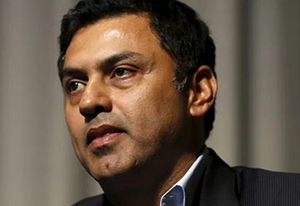New Delhi, Jun 21: India-born Softbank President and COO Nikesh Arora has resigned from the company with effect from June 22 but will stay in advisory role for a year.
"SoftBank Group Corp (SBG) announces the resignation of Nikesh Arora, Representative Director, President & COO, from the position of Representative Director and Director of SBG with the expiration of the term of office at the conclusion on of the 36th Annual General Meeting of Shareholders," SoftBank said in a statement.
The meeting will be held on June 22.
"The difference of expected timelines between the two leads to Arora's resignation from the position of representative Director and Director of SBG with the expiration of the term of office and his next steps," the Japanese firm statement said.
Arora, who was being seen as the successor to SoftBank Chairman and CEO Masayoshi Son, in a tweet said he plans to support the group for an year and "hence continuing as advisor".
Arora, who is the Representative Director, President and COO of SBG currently, will assume an advisory role, effective July 1.
Praising Arora's work at SBG, Son said he should be CEO of a global business.
"I had hoped to hand over the reins of SoftBank to him on my 60th birthday - but I feel my work is not done. I want to cement SoftBank 2.0, develop Sprint to its true potential and work on a few more crazy ideas. This will require me to be CEO for at least another five to ten years - this is not a time frame for me to keep Nikesh waiting for the top job," he said in a statement.
He added that Arora will move to an advisory role and continue to support SoftBank, while he zeroes in on his next challenge.
"Masa 2 continue 2 be CEO for 5-10 years, respect that. Learnt a lot. Clean chit from board after through review. Time for me to move on," Arora said in a tweet.
"Going to continue to support the Indian startup ecosystem....can't change faith if you change jobs :)!," he said in another tweet.
Yesterday, SoftBank had said the allegations levelled by some shareholders against Arora, including those questioning his conduct and qualifications, have been found to be "without merit".
Arora had joined SoftBank as its Vice-Chairman and CEO of SB Group US -- previously SoftBank Internet and Media Inc -- in September 2014 from search giant Google.





Comments
Add new comment